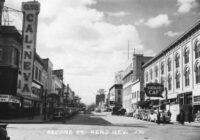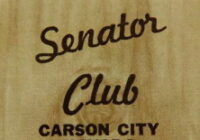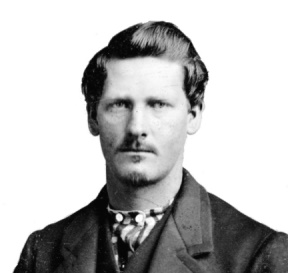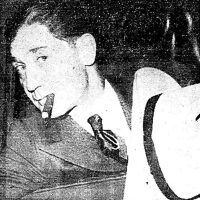|
Listen to this blog post here
Getting your Trinity Audio player ready...
|
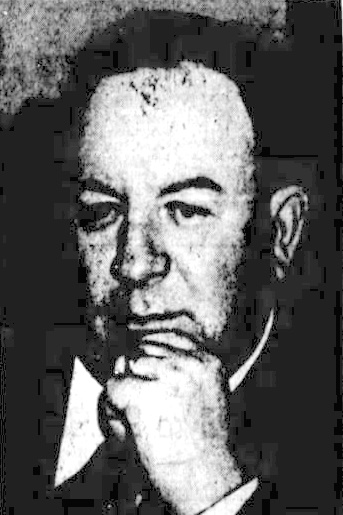
Duffin
1959-1960
William “Bill” E. Duffin, co-owner of the Senator Club in Carson City, Nevada, was murdered on Christmas morning of 1959 (see Part I). He left behind his wife Gladys, his sister, his nephew, a business partner and many employees to whom he was like a father.
Duffin moved to Nevada in 1943. Before acquiring the Senator with Stella C. Vincent, the two had operated the Wild Horse Hunting Lodge in Elko for 14 years. Prior to that, the Salt Lake City native had operated pinball machines in San Francisco.
The Suspect
Carson City police quickly honed in on Nicholas “Nick” V. Goodman as the likely perpetrator. He was the former Senator Club dealer whom Duffin had fired for cheating customers during 21 games. As a result, Nick’s casino work card had been revoked.
Investigators learned that when Nick had lost that job in mid-1958, he’d threatened Duffin and then-pit boss, Thomas Scarlett. Since, the dealer had harbored a grudge against Duffin.
Throughout those 18 months, Nick had remained unemployed except for a fleeting stint in January 1959. That was when he’d worked for two hours at the Holiday Hotel in Reno and was let go, when this new employer learned about his alleged past cheating.
Senator Club workers told police Nick repeatedly had asked Duffin to “sign a statement clearing him of the cheating charge,” reported the Nevada State Journal (Dec. 29, 1959). Each time, Duffin had refused. This had happened most recently two weeks before the business owner was slain.
Vincent reported Nick had badgered her as well to get his work permit reinstated. She, too, though, had told him again and again she wouldn’t. Their most recent interaction had been on December 21, when Nick had showed up at her home, uninvited, and warned her, “Get my card back or else” (NSJ, May 28, 1960).
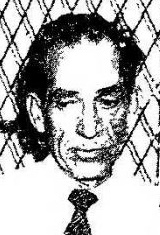
Goodman
The Evidence
When investigators questioned Nick, he had gunshot residue on his hands. He explained that by saying he’d fired a gun on Christmas Eve but as a test.
The suspect didn’t have a strong alibi for when the shooting of Duffin had occurred. Nick said he’d been away from home, but had been looking for his wife Genevieve Goodman, as they’d gotten separated when they’d been out earlier. (The time of the murder was 3:20 a.m.)
Some days later, the California Bureau of Criminal Investigation and Identification determined the bullets fired from Nick’s rifle matched those removed from Duffin’s body.
The Help
Police also arrested a Carson City handyman named Jack Armstrong for allegedly having hidden the murder weapon. They charged him with being an accessory after the fact.
Genevieve also wound up in jail, for allegedly having directed Armstrong to get rid of the gun and later, when she’d learned police were searching for it, having told him to move it.
All three suspects were going to be given lie detector tests.
The Admissions
They all came clean, one at a time, on December 28, three days after the crime.
Armstrong conceded he’d repaired the 0.22-caliber rifle Nick had used and had hidden it in a manure pile after the shooting.
Genevieve gave up Nick. Her hot-tempered husband, she added, had been growing increasingly angry at and preoccupied with Duffin for more than a year. that She also admitted her role.
Then Nick himself confessed he in fact had shot Duffin.
“I just went wild … berserk, I guess. I kept pulling the trigger,” Nick told police (NSJ, May 27, 1960).
The confessed murderer also revealed he’d tried to kill his ex-boss six months earlier one day when he’d spotted him inserting coins into a Carson City parking meter. When the gun had misfired, Nick had aborted the attempt.
Police let Armstrong and Genevieve go. The district attorney charged Nick with murder, for which he pleaded not guilty.
The Trial
When Nick’s trial got underway in mid-May 1960, he faced a potential death penalty if convicted.
District Attorney John Tom Ross and special prosecutor Emile Gezelin called a handful of witnesses to testify and played, for the jurors, the tape recording of Nick’s confession. Overall, the prosecutors laid out a strong case for Nick being guilty of the murder.
Nick’s defense attorneys, Samuel Francovich of Reno and Jack B. Tenney of Los Angeles, conceded the defendant had killed Duffin but argued he’d been insane when he’d done it. To save him from capital punishment, the team attempted to prove “Goodman went insane after 18 months of brooding and trying to prove his innocence in a cheating episode which cost the club its gaming license and himself his right to work at Nevada’s legal card tables,” the NSJ reported (June 1, 1960).
The bottom line for the jurors was whether or not Nick had been of sound mind when he’d shot and killed Duffin. The prosecution asserted yes, he had been. They called for a first degree murder verdict and demanded the death penalty. The defense argued no, he hadn’t been sane. They demanded acquittal.
The Verdict
After nearly eight hours of deliberating, the jury of eight women and four men found Nick guilty of second degree murder. This conviction carried a prison term, not capital punishment, as a penalty.
“Defense attorneys Sam Francovich and Jack Tenney, together with Goodman’s wife, were jubilant over the second-degree finding. But Goodman was angry,” the NSJ reported (June 4, 1960). “‘For what?’ he snapped when newsmen congratulated him.”
Judge Frank B. Gregory sentenced Nick to a statutory 10 years to life term in Nevada State Prison.
After serving six years, Nick was granted early parole and released.
——————————-

